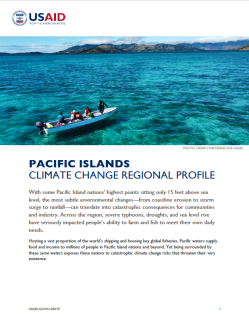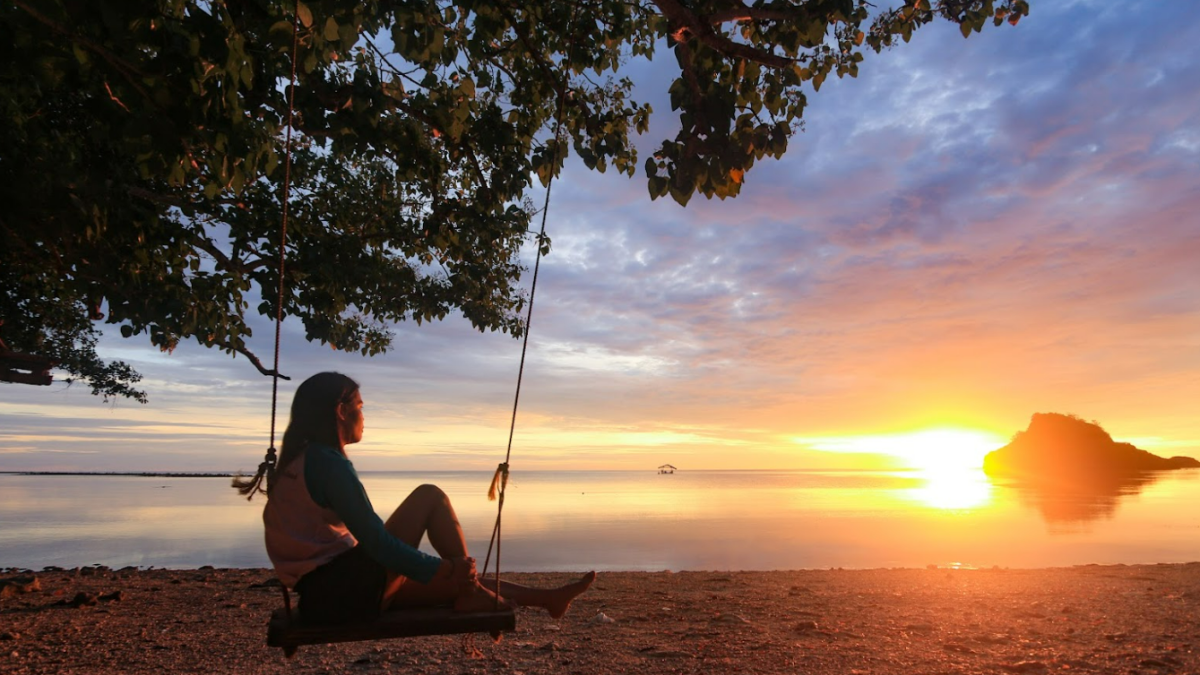Hosting a vast proportion of the world’s shipping and housing key global fisheries, Pacific waters supply food and income to millions of people in Pacific Island nations and beyond. Yet being surrounded by these same waters exposes these nations to catastrophic climate change risks that threaten their very existence.
Pacific Islands Regional Climate Priorities
The shared vision of the 18 country and territory members of the Pacific Island Forum’s “2050 Strategy for the Blue Pacific Continent” is for all Pacific peoples to lead free, healthy, and productive lives. USAID is listening, partnering, and delivering on shared commitments in the Blue Pacific Continent to bring this collective Pacific vision to life. The waterways and natural environments that connect the Blue Pacific are deeply interwoven with Pacific peoples livelihoods, cultural values, and traditional knowledge. USAID supports the governments and local partners to protect the ocean and biodiversity of the region while empowering Pacific peoples to showcase their resilience by leading with local solutions when addressing the impacts of climate change and natural disasters.
USAID’S Climate Change Program: Objectives and Results
The USAID/Pacific Islands Mission oversees activities in nine Pacific Island countries: Fiji, Kiribati, Nauru, Samoa, Tonga, Tuvalu, Federated States of Micronesia, Republic of the Marshall Islands, and Palau. In partnering with Pacific Island nations to achieve their development vision, USAID focuses on listening to their unique perspectives while delivering on regional priorities, including helping communities better respond and adapt to climate impacts and build resilience to extreme and unpredictable weather.
Adaptation
USAID prioritizes engagement with international multi-donor trust funds that support adaptation so that countries—especially small island developing states and fragile states—can more easily access climate finance.
At the community level, USAID also supports disaster preparedness interventions and community-level capacity building related to climate change issues. By providing grants to local civil society organizations, USAID works to increase the resilience of communities to the negative impacts of climate change, and assist them in implementing adaptation and early-warning strategies.
Key Results
USAID has helped:
- Support Pacific Islands to mobilize more than $572 million in climate finance from international organizations since 2016; with USAID support, Pacific Island countries have accessed funding for climate adaptation projects to improve health, food and water security, marine ecosystems, biodiversity protection, conservation, and natural resource management
- Train key actors in the Pacific Islands on climate change, disaster preparedness, energy security, and other relevant areas
- Support local NGOs in Fiji to build a more climate-resilient economy by training farmers how to use adaptive agricultural practices, integrate traditional farming knowledge and skills in crop rotation and reforestation, and use local rainwater harvesting and drip irrigation systems to ensure a consistent, drought-resilient water supply
- Support the Fiji Development Bank to meet Green Climate Fund accreditation requirements and become the first development bank in the Pacific to be accredited to the fund
- Led the first diploma-level Project Management course—training participants in project governance, time management, cost and procurement, risk management, communications, and team effectiveness—in order to help Tuvaluans adapt to the impacts of climate change
- Support a women’s group in Palau to access funding to restore taro production—a key food security crop—by improving water systems and promoting taro cultivation in surrounding local communities
- Assist the Government of the Marshall Islands in accessing funding that is protecting clean water for 28 percent of the population—freshwater supplies that otherwise would be threatened by climate change–linked saltwater intrusion
- Introduce disaster-resilient agricultural techniques in the Federated States of Micronesia to help ensure food security for communities despite climate-related threats
- Hold dialogues in the Marshall Islands with women shell harvesters to set up women cooperatives and train them on financial literacy and conservation enterprise development to strengthen the resilience of both coastal ecosystems and fishery-based livelihoods
- Reconstruct and repair homes and public infrastructure damaged by Typhoons Maysak and Wutip and Tropical Storm Jelawat in the Federated States of Micronesia; USAID also worked with local officials to identify the level of need for relocating some new homes out of areas vulnerable to rising sea levels, and strengthened new homes with additional structural features to enhance wind-resistance
Natural Climate Solutions
USAID helps communities implement natural climate solutions to mitigate climate change while supporting livelihoods and building climate resilience. USAID also promotes transparency, accountability, and other principles of democracy that are vital to achieving climate resilience.
Key Results
USAID has helped:
- Preserve the ability of coastal and marine ecosystems in the Federated States of Micronesia to deliver climate mitigation benefits by promoting the use of locally relevant knowledge in ecosystem protection, like fish monitoring and surveillance
- Mobilize more than $22 million in funding for Samoa to empower local communities to improve land-use practices, helping safeguard indigenous species, natural ecosystems, and food production systems and directly benefiting 25,000 people across 60 villages
For More Information




